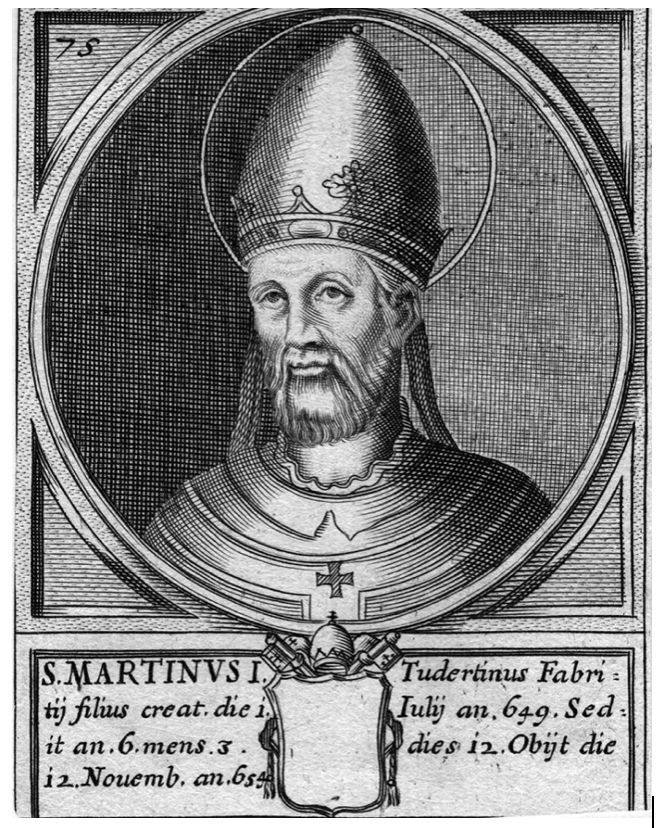Feast Day: April 13th

Intriguingly, one article I read about Pope Martin said that he was the last pope to be martyred when he was exiled to starvation on the island of Cherson (in the Crimea) in 655. A little bit of research indicated that he is truly the last pope acclaimed as a martyr, though there have been plenty of successors to St. Peter in these intervening 1400 years who have been strangled, poisoned, maltreated, or starved until their demises … but are not acclaimed as martyrs because their death was not out of hatred for the Christian faith.
Pope Martin’s death was … and yet he was killed by Christians. How? Why? … We should probably rewind the story a bit.
Martin was born in Italy, and blessed with a honorable family and an intelligent mind. The haze of history obscures his early years, but by the time he is in his 40s, he is an abbot of a monastery of St. Basil and is being sent by Pope John IV to Dalmatia (nowadays Crete) with money to aid the inhabitants there who were suffering from ruinous invasions. Martin had been known for his generosity, but would soon be known also for his diplomacy, because Pope Theodore (another two popes down the line from John IV) tapped Martin to be his apocrysiary (basically a legate/envoy) to Constantinople.
This would not turn out to be a cushy assignment.
The Council of Chalcedon was now 2 centuries in the past, but the truth that the Church had pronounced then – that Christ had two natures: human and divine – was now apparently up for debate again, at least the court of Constantinople (an impossible to discern jumble political and religious leaders, with emperor and patriarch contending for authority and admiration) where the latest twist on the ancient Christological heresies was to say that Christ did have two natures but only one will. Pope Honorius I had feebly avoided controversy and let the falsehood fester, and now his successors were dealing with the consequences as the Eastern lung of the Church threatened to slide into denying the full humanity of their Savior. Ambiguity, heresy, avoiding hard decisions, stubbornness, recalcitrancy… none of it is new!
Martin would be elected Pope in 649 and one of the first things he did was call an ecumenical council to be held at the Lateran Basilica in Rome. One of the first things he did not do was ask for the Emperor of Constantinople (Constans II) to ratify his election as Pope. He ruffled plenty of feathers with both actions. 105 bishops from around the Christian world rejected as heresy the claim that Christ had only one (divine) will, and notwithstanding the threats of force, coercion, and attempted assassination against Martin, the saintly pope wrote of this truth in an encyclical and had the translated decrees sent as well over to Constantinople.

Constans ordered the Pope arrested, which would take place in that same Lateran Basilica a few years later, after which Martin was brutally transported to Constantinople, marched through the frozen streets stripped, bloodied, and hobbling, and condemned to death, though, in the end, he would be merely banished to the pagan island of Cherson in 655. Every conceivable political crime had been heaped upon him, but it was his refusal to sign off on heresy that sent him to his death.
His words, perhaps more than mine, should inspire us all: “It is now forty-seven days since I have been permitted to wash myself either in cold or warm water. I am quite wasted and chilled, and have had no respite either upon sea or land from the flux which I suffer. My body is broken and spent, and, when I would take any nourishment, I want such kind of food as is necessary to support me; and have a perfect aversion and loathing to what I have. But I hope that God, who knows all things, when he shall have taken me out of this world, will bring my persecutors to repentance.”
– Fr. Dominic Rankin often prays for the grace of perseverance (and repentance!). It is hard enough to stay faithful through an average day’s duties, much less the brutality, deprivation, and scorn suffered by Pope St. Martin. Yet the truth he gave his life to defend – that Christ has a human will, one united with His Divine Will – was one that the saintly pope also lived out. “Not My will, but Yours, be done” were words spoken by Our Lord, but they have been repeated by every saint since, whether in word or deed. May we have the grace to do the same.